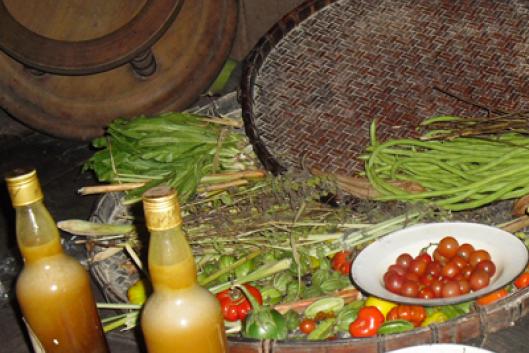Compared with the struggle to stop the destruction of forests, the resistance of forest-dependent communities against governments facilitating corporate control over their traditional knowledge and use of seeds, plants and animals on which they depend and build their local food, health, economic, religious and spiritual systems is less visible – but no less important. This bulletin focuses on that struggle where the stakes are equally high, over who controls traditional and intellectual knowledge linked to seeds, plants and animals. We could also call it the struggle to defend a collective way of living that secures the well-being and survival of communities, or just the battle to defend life.
Free trade agreements are at the top of many governments´ agendas and the UN is getting ready for yet another CBD (Convention of Biological Diversity) conference round. So, we felt time was right for a WRM bulletin edition exploring how the process of privatization and appropriation of genetic diversity undermines the way of life of forest-dependent communities.
An interview with Kichwa leader Blanca Chancoso from Ecuador shows how reducing (genetic) diversity to a “genetic resource” that can be isolated from the complex interactions that created it in the first place, and for which 'benefit sharing protocols' can be negotiated, helped prepare this diversity for corporate take-over. “They are not sharing benefits, they have never shared any”, is one of Blanca's key observations. It's the result of many years of experience accumulated by indigenous peoples in Ecuador and around the world with corporations entering their territories to grab not only “genetic resources” but also timber, minerals, and oil or promote hydropower dams, monoculture plantations, etc.
Corporate greed for control over what pharmaceutical corporations, agribusiness and the UN Convention on Biological Diversity have come to make us call “genetic resources” is also driving governments of so-called “biodiverse” countries in the global South to facilitate that corporate control over genetic diversity and "biodiversity" more broadly. Brazil, for example, is in the process of adopting new legislation that would hand over for “free” to transnational corporations the “genetic resources” on which local indigenous peoples and peasant communities built their way of life and which provides their livelihood. One bulletin article describes how corporate leaders had preferential access to the law-making process long before peasant organizations, indigenous peoples, traditional communities and others whose way of life the new law would gravely affect were given the chance to make their views known on the proposed legislation. Another article describes why in Guatemala, the Constitutional Court ruled that the Nagoya Protocol, one of the key international agreements on 'access to genetic resources and benefit sharing' negotiated under the CBD, violates the country's Constitution. The court ruling prohibits the Protocol's transposition into national law.
Two further articles outline how the western concept of the world where "plants" and "animals" are abstracted to "genetic resources", “biodiversity” and “ecosystem services” is allowing governments and UN institutions like the CBD to come up with proposals for 'benefit sharing protocols', 'biodiversity offsets', 'REDD+' or 'synthetic biology'. These initiatives and the instruments they breed are becoming new forms of biopiracy and plundering, threatening communities and territories. The articles show how these new instruments of corporate plunder go hand in hand with control and surveillance of community life, a consequence La Via Campesina has been denouncing for many years: peasant, indigenous and other traditional populations are increasingly and with increasing aggression restricted in their free use, conservation and exchange of seeds and other agrobiodiversity essential to their way of life.
Collective struggles of forest-dependent peoples and populations have many dimensions. A fundamental one is the physical resistance against outright destruction in the territories; another crucial one is the defense of the free use and sharing of seeds, plants, animals on which forest communities so crucially depend. This diversity has coevolved with the particular cultivation systems forest communities, and women within these communities in particular, have nurtured for generations. It is this web of diversity which corporations are working hard to reduce to patentable "genetic resources" that can be placed under corporate control. The examples in this bulletin show why it is so important to prevent this corporate grab of seeds and diversity. They also show how communities and peasant organisations are guarding their right to free use and sharing of the diversity their traditional knowledge systems have created.
We hope you will enjoy the read!
